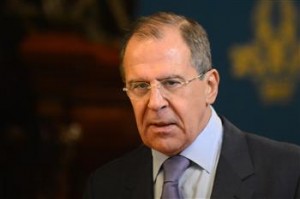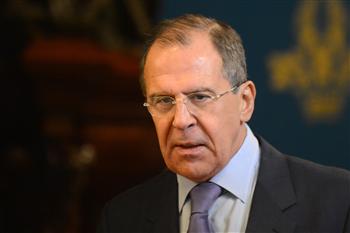
Photo: Russian Foreign Minister Sergei Lavrov (AFP Photo)
(AFP) – Russia’s foreign minister Tuesday slammed “extremists” in the Syrian opposition who he said were blocking the start of dialogue in the war-torn country, ahead of talks with US Secretary of State John Kerry.
Hours before he was due to meet Kerry, Sergei Lavrov said that recent faint hopes that dialogue was possible between the opposition and the regime of Syrian President Bashar Al-Assad had dissipated.
“It seems that extremists who bet on an armed solution to the Syrian problem have prevailed in the ranks of the opposition at this time, including the so-called (Syrian) National Coalition, blocking all initiatives that could lead to the start of dialogue,” Lavrov told reporters.
Kerry meets his Russian counterpart here later Tuesday in a bid to bridge differences between Moscow and Washington over Syria, after convincing the opposition to take part in an international meeting on the conflict.
The diplomatic push by the top US diplomat, on an 11-day tour of Europe and the Middle East, his first foreign trip since taking over the office, coincided with the Syrian regime saying it was ready to talk to armed rebels.
Russia is one of the few big powers to keep ties with the Al-Assad regime amid the conflict with rebels and together with China has vetoed UN Security Council resolutions that would have introduced sanctions against Damascus.
After denouncing Moscow’s intransigence over Syria for months, Washington has recently toned down its criticism.
“We’ve been absolutely clear that there needs to be a political transition, and we felt that Russia could play a key role in convincing the regime… that there needs to be that political transition,” a State Department official told reporters.
However Kerry is not expecting “a big breakthrough” at the meeting, the official added.
Lavrov said after meeting Syria’s foreign minister Walid al-Muallem in Moscow Monday that there was “no acceptable alternative to a political solution achieved through agreeing positions of the government and the opposition”.
But, said Lavrov, the Syrian people must decide their fate “without external intervention”.
Syria’s opposition has been calling for the international community to do more — the United Nations says the fighting has claimed 70,000 lives since the conflict began in March 2011 — warned last week it would withdraw from an international conference in Rome planned for Thursday.
But Kerry and British Foreign Secretary William Hague convinced the Syrian National Coalition Monday to revoke its boycott of the 11-nation Friends of Syria meeting after an appeal at a joint press conference in London.
Syrian National Coalition chief Ahmed Moaz al-Khatib said on his Facebook page his group would attend after Kerry and Hague “promised specific aid to alleviate the suffering of our people”.
“I want our friends in the Syrian opposition council to know that we are not coming to Rome simply to talk. We are coming to Rome to make a decision on next steps,” Kerry told reporters on the first leg of his nine-nation tour.
Syrian Foreign Minister Walid al-Muallem said in Moscow Monday that the authorities in Damascus were ready to talk to armed rebels, the first time a senior official of Al-Assad’s regime has made such a proposal.
“We are ready for dialogue with all who want dialogue, including those who are carrying arms,” he said.
“We still believe in a peaceful solution to the Syrian problem,” said Muallem, proposing the creation of a government coalition that would negotiate with both the “external and internal opposition.”
But the rebel Free Syrian Army’s chief of staff Selim Idriss dismissed Muallem’s offer.
Kerry, on taking over the job from Hillary Clinton in early February, spoke of a diplomatic initiative on Syria soon.
US President Barak Obama’s administration has resisted calls for it to deploy military assets to help opposition forces in Syria and has stopped short of arming forces fighting Al-Assad’s troops.
But it has provided non-lethal logistics and medical and humanitarian support to rebels.
Britain wants to provide more support for the Syrian rebels but is bound by an EU arms embargo, which last week European foreign ministers decided not to lift.
The trip sees Kerry, the son of a diplomat, back on familiar ground. He spent part of his childhood in Berlin and has family in France.
